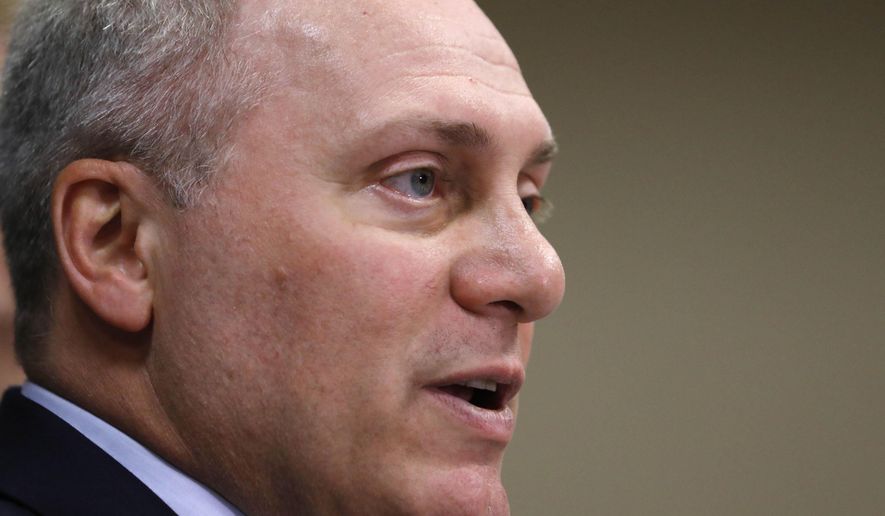House Minority Whip Steve Scalise, who was shot by a supporter of Sen. Bernard Sanders as he yelled “this is for health care,” cautioned against pointing political fingers after mass shootings over the attacker’s motivations, warning it can be a “slippery slope.”
The Louisiana Republican, who required multiple surgeries to survive the politically motived shooting, pointed to his own close-call as an example of that lesson and asked that Democrats, who are accusing President Trump of rhetorically inspiring the anti-Hispanic El Paso, Texas, massacre, see all attacks the same way.
“The president is no more responsible for that shooting as your next guest, Bernie Sanders, is for my shooting,” Mr. Scalise said on CBS’ “Face the Nation.” “The shooter is responsible.”
In June 2017, Mr. Scalise was shot while practicing for the annual charity baseball game against Democrats. Gunman James T. Hodgkinson, who was killed in a shootout with officers, shared anti-Trump messages leading up to the shooting and found to be a volunteer with Mr. Sanders’ 2016 presidential campaign.
When he appeared shortly afterward on “Face the Nation,” Mr. Sanders told the CBS program that his campaign stresses that even revolutionary change must come in a nonviolent way.
But he added that he cannot guarantee that all of his supporters are “the kind of person that I would like.”
Regarding the president, Mr. Sanders agreed that Mr. Trump doesn’t want violence but said he does create an environment that fosters resentment and its resulting violence.
“President Trump and nobody else wants to see people mowed down and killed, and I’ve never said that,” Mr. Sanders said. “I think he creates a climate where we are seeing a significant increase in hate crimes in this country, hate crimes against Muslims, against Mexicans, against Jews. He is creating the kind of divisiveness in this nation that is the last thing that we should be doing.”
In his interview, Mr. Scalise pointed to another recent mass shooting in Dayton, Ohio, that left nine dead and dozens more injured. That gunman was a supporter of Sen. Elizabeth Warren, Massachusetts Democrat, but the senator hasn’t been — and shouldn’t be — held to account or blamed for his actions, Mr. Scalise argued.
There is no evidence that the Dayton shooter, despite his support of Ms. Warren, was motivated by her rhetoric, themes or campaign.
Many critical of the president, including several 2020 Democratic presidential primary candidates in addition to Mr. Sanders, have condemned the president’s rhetoric in light of the shooting, arguing that it incites violence and spurs racial divisions. Several have gone so far as to call him a white supremacist.
Sen. Cory A. Booker of New Jersey said it’s not enough to just not engage in racist behavior, but individuals and the government have a duty to actively push back on violence-inciting racism.
“We have somebody who is actually adding to it, who is contributing to this kind of divisiveness and these kind of dark forces in our nation through his own rhetoric, through the way he talks about Americans, through the bigotry that passes through his lips that incites white supremacists to literally use his language in their chat rooms to further activate this kind of hate,” he said of Mr. Trump.
The president has brushed off the criticism from Democrats, saying they were desperate to tie him to racial divisions in order to score political points.
“I think it shows how desperate the Democrats are,” Mr. Trump told reporters. “I am not any of those things. For them to throw out the ’racist’ word, racist, racist, racist — they call anybody a racist when they run out of cards. I’m winning in the polls. They’re desperate.”
Mr. Scalise said that instead of trying to point blame across the aisle, lawmakers should focus on shoring up background check systems to ensure that people who are mentally unfit to have a gun fall through the cracks.
He argued that background check legislation passed by Democrats earlier this year didn’t actually solve the root of the problem, and stressed that lawmakers need to focus on making it so dangerous people are indeed flagged in the system.
Mr. Trump announced he’s interested in expanding background checks, but was unclear what Congress will be able to pass out of both chambers.
Sen. Lindsey Graham announced a bipartisan deal earlier this week to pass red flag laws that push states to let law enforcement confiscate guns from those reported as a potential threat.
Democrats, however, want to go further and are planning to push for other proposals, like an assault weapons ban.
While Republicans have hesitated to support gun control bills they see as violating the Second Amendment, presidential counselor Kellyanne Conway insisted on “Fox News Sunday” that the differences are “all reconcilable.”
“The president has been actively talking to Republicans and Democrats on the matter of background checks and just being able to have meaningful, measurable reforms that don’t confiscate law-abiding citizens’ firearms without due process, but at the same time, keep those firearms out of people who have a propensity towards violence,” she said.
⦁ Dave Boyer contributed to this report.
• Gabriella Muñoz can be reached at gmunoz@washingtontimes.com.




Please read our comment policy before commenting.